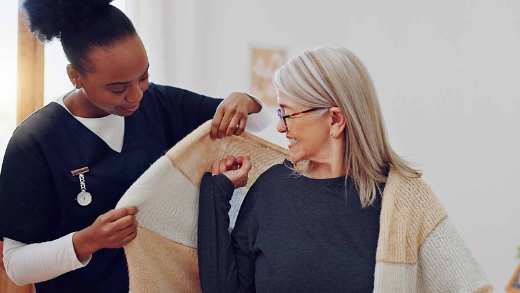5 things a cancer nurse wishes you knew about cancer care
Our resident expert on living with cancer and how the care community can help

By Amanda Windsor, Clinical Health Advisor with over 20 years in Oncology Nursing
Cancer care is designed to support you and your loved ones before, during and after treatment. While cancer is often difficult, the care community of doctors, nurses, and charity workers is truly special and can make a huge difference to people living with cancer.
As a registered nurse with over 20 years’ experience in cancer care, I’ve seen all the highs and lows of treatment, and these are the 5 things I wish everyone knew about cancer care and living with cancer.
- Ask questions to get answers
A cancer diagnosis can be an overwhelming and emotional thing for you and your family. It’s very easy to get confused with all the new information you’ll get presented with or to get lost in an online rabbit hole. If you’re unsure or want to know more about anything, the best thing to do is ask your doctor or your clinical nurse specialist. That’s what they’re there for.
You can ask for details about your diagnosis (if you want to know), you can ask for detailed information about your treatment, what it is, why do you need it, what are the risks and benefits.
You can also ask for a second opinion from a different specialist.
There’s no such thing as a stupid question, especially when it comes to cancer. - Look after your mental health
It’s completely normal to feel worried or anxious about a cancer diagnosis or the treatment you’re having. Preparing yourself for treatment can help patients feel more in control and could help manage feelings of stress, anxiety, or depression.
Talking can also help patients feel more in control, whether it’s to friends and family or a support group. Your clinical nurse specialist will always be on hand to support you, whether it’s to answer questions about your treatment or for a friendly natter and a cup of tea.
Remember, a problem shared is a problem halved. - Cancer screening on the NHS
Screening uses tests to help find cancers so that they can be treated early and reduce the chance of that cancer developing. Getting an early diagnosis can make a huge difference to your treatment and your chances of overcoming cancer, so I’d always recommend attending a cancer screening if you can.
There is currently screening on the NHS for three types of cancer Footnote [1]:
Cervical cancer - screening is offered every three years to people with a cervix aged between 25-49, and every five years for ages 50-64.
Breast cancer - screening is offered to women aged 50-70 years of age to detect early signs of breast cancer. Women aged over 70 years can refer themselves.
Bowel cancer - screening is offered via a home test kit to everyone aged 60-74 every two years. Those aged over 75 can request a kit every two years by calling the free bowel cancer screening helpline. - Prehabilitation
Many hospitals now offer prehabilitation to help those diagnosed with cancer prepare for treatment. Patients can be recommended a programme of exercise, nutrition, and mental health support to help manage their treatment and improve long term health. This can help get your health in a better position to cope with and respond to your treatment, as well as giving you an element of control and something to aim for with your health - Cancer charities go above and beyond
Many people think of cancer care as something hospital-based, but there is a network of support throughout the country and the community. There are many regional and national charities that offer support to people living with cancer and their loved ones, as well as giving advice on everyday things like finances and prescriptions.
Macmillan Cancer Support is one of the largest cancer support charities in the UK and have a wealth of expertise and advice on cancer diagnosis and treatment, as well as help with how you're feeling, money and work and local support in your community Footnote [2].
They also offer financial advice to people who find it difficult to work following a cancer diagnosis. If you’re struggling to pay for bills or prescriptions, need help with travel or hospital parking costs, or need advice on how to manage your work situation, Macmillan and other charities can help get you started and give you confidence in life with cancer.
Next article
Worried about GP and hospital wait times?
Here's how quickly you could get treated with health insurance.



